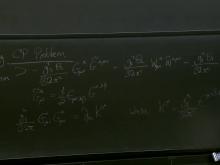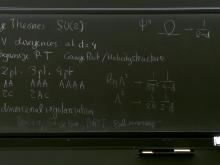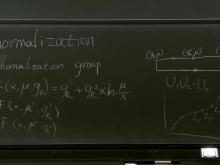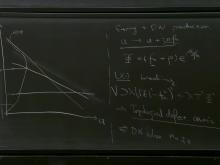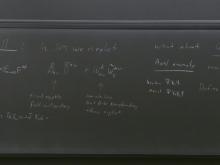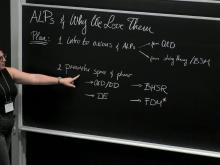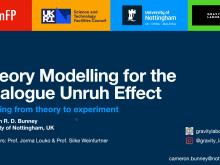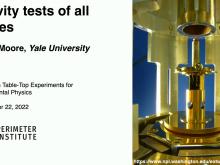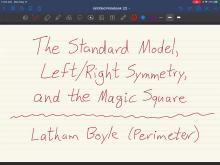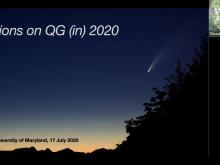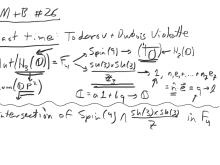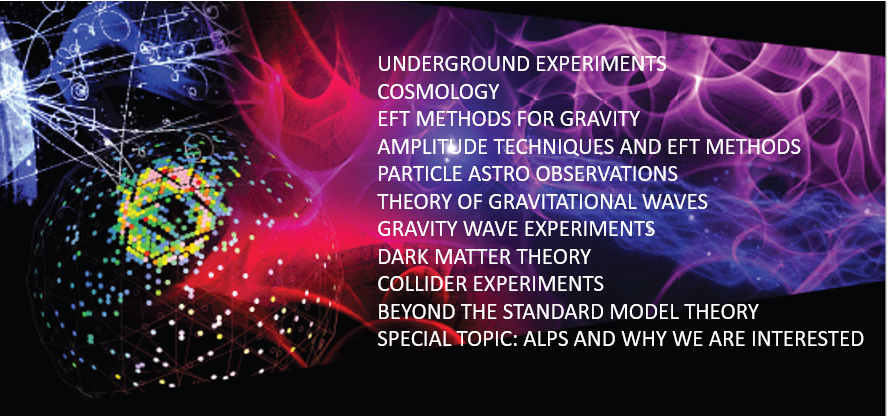Particle physics is the science which identifies nature's constituents and interactions at the most fundamental level, with an emphasis on comparing theoretical ideas with both terrestrial experiments and astrophysical observations. This mandate gives it a strong overlap with string theory, quantum gravity and cosmology. Particle physicists at Perimeter Institute are currently involved in identifying how cosmological observations and terrestrial accelerator and underground experiments constrain the theoretical possibilities for physics beyond the Standard Model.
Format results
-
4 talks-Collection NumberC25035
Talk
-
Standard Model (Elective), PHYS 622, January 6 - February 5, 2025
13 talks-Collection NumberC25003Talk
-
Quantum Field Theory II (Core), PHYS 603, November 12 - December 11, 2024
14 talks-Collection NumberC24035Talk
-

Lecture - QFT II, PHYS 603
Francois David CEA Saclay
-

Lecture - QFT II, PHYS 603
Francois David CEA Saclay
-

Lecture - QFT II, PHYS 603
Francois David CEA Saclay
-

Lecture - QFT II, PHYS 603
Francois David CEA Saclay
-

Lecture - QFT II, PHYS 603
Francois David CEA Saclay
-

Lecture - QFT II, PHYS 603
Francois David CEA Saclay
-

Lecture - QFT II, PHYS 603
Francois David CEA Saclay
-

Lecture - QFT II, PHYS 603
Francois David CEA Saclay
-
-
Quantum Field Theory I (Core), PHYS 601, October 7 - November 6, 2024
13 talks-Collection NumberC24034Talk
-

Lecture - QFT I, PHYS 601
Gang Xu Perimeter Institute for Theoretical Physics
-

Lecture - QFT I, PHYS 601
Gang Xu Perimeter Institute for Theoretical Physics
-

Lecture - QFT I, PHYS 601
Gang Xu Perimeter Institute for Theoretical Physics
-

Lecture - QFT I, PHYS 601
Gang Xu Perimeter Institute for Theoretical Physics
-

Lecture - QFT I, PHYS 601
Gang Xu Perimeter Institute for Theoretical Physics
-

Lecture - QFT I, PHYS 601
Gang Xu Perimeter Institute for Theoretical Physics
-

Lecture - QFT I, PHYS 601
Gang Xu Perimeter Institute for Theoretical Physics
-

Lecture - QFT I, PHYS 601
Gang Xu Perimeter Institute for Theoretical Physics
-
-
Particle Physics
12 talks-Collection NumberC24009Talk
-

Particle Physics Lecture
Asimina Arvanitaki Perimeter Institute for Theoretical Physics
-

Particle Physics Lecture
Asimina Arvanitaki Perimeter Institute for Theoretical Physics
-

Particle Physics Lecture
Asimina Arvanitaki Perimeter Institute for Theoretical Physics
-

Particle Physics Lecture
Asimina Arvanitaki Perimeter Institute for Theoretical Physics
-

Particle Physics Lecture
Asimina Arvanitaki Perimeter Institute for Theoretical Physics
-

Particle Physics Lecture
Asimina Arvanitaki Perimeter Institute for Theoretical Physics
-

Particle Physics Lecture
Junwu Huang Perimeter Institute for Theoretical Physics
-

Particle Physics Lecture
Junwu Huang Perimeter Institute for Theoretical Physics
-
-
Standard Model 2023/24
13 talks-Collection NumberC24006Talk
-
TRISEP 2023
39 talks-Collection NumberC23020Talk
-
Quantum Simulators of Fundamental Physics
23 talks-Collection NumberC23019Talk
-

-

Simulating one-dimensional quantum chromodynamics on a quantum computer: Real-time evolutions of tetra- and pentaquarks
Christine Muschik Institute for Quantum Computing (IQC)
-

-

Five short talks - see description for talk titles
-
Barbara Soda Perimeter Institute for Theoretical Physics
-
Dalila Pirvu Invisible Technologies
- Leonardo Solidoro, Pietro Smaniotto, Kate Brown
-
-

First observations of false vacuum decay in a BEC
Ian Moss Newcastle University
-

Building Quantum Simulators for QuFTs
Jorg Schmiedmayer Technical University of Vienna
-

-

-
-
School on Table-Top Experiments for Fundamental Physics
27 talks-Collection NumberC22030Talk
-

Welcome & Opening Remarks
-
Asimina Arvanitaki Perimeter Institute for Theoretical Physics
-
Junwu Huang Perimeter Institute for Theoretical Physics
-
Davide Racco ETH Zurich
PIRSA:22090001 -
-

Standard Model & EDM, g-2
Jesse Thaler Massachusetts Institute of Technology (MIT)
-

-

5th forces and astrophysical probes
Peter Graham Stanford University
-

Atom interferometry, atomic clocks
Jason Hogan Stanford Law School - The Bill Lane Centre for the American West
-

Non thermal DM/Misalignment
Giovanni Villadoro The Abdus Salam International Centre for Theoretical Physics (ICTP)
-

Non thermal DM/Misalignment
Giovanni Villadoro The Abdus Salam International Centre for Theoretical Physics (ICTP)
-

Atom interferometry, atomic clocks
Jason Hogan Stanford Law School - The Bill Lane Centre for the American West
-
-
Octonions and the Standard Model
16 talks-Collection NumberC21001Talk
-

Welcome and Opening Remarks
Kirill Krasnov University of Nottingham
-

Finite quantum geometry, octonions and the theory of fundamental particles.
Michel Dubois-Violette University of Paris-Saclay
-

Supersymmetry and RCHO revisited
Paul Townsend University of Cambridge
-

Spin (8,9,10), Octonions and the Standard Model
Kirill Krasnov University of Nottingham
-

Gravity as the square of gauge theory
Leron Borsten Heriot-Watt University
-

A Magic Pyramid of Supergravity Theories from Yang-Mills Squared
Mia Hughes Imperial College London
-

Division algebraic symmetry breaking
-
Cohl Furey Humboldt University of Berlin
-
Mia Hughes Imperial College London
-
-

Clifford algebra of the Standard Model
Ivan Todorov Bulgarian Academy of Sciences
-
-
Quantum Gravity 2020
22 talks-Collection NumberC20031Talk
-

Welcome and Opening Remarks
Bianca Dittrich Perimeter Institute for Theoretical Physics
-

Approaches to Quantum Gravity: Key Achievements and Open Issues
Hermann Nicolai Max-Planck-Institut für Gravitationsphysik
-

Quantum gravity from the loop perspective
Alejandro Perez Aix-Marseille University
-

Lessons for quantum gravity from quantum information theory
Daniel Harlow Massachusetts Institute of Technology (MIT)
-

Understanding of QG from string theory
Herman Verlinde Princeton University
-

Progress in horizon thermodynamics
Aron Wall University of Cambridge
-

Asymptotically Safe Amplitudes from the Quantum Effective Action
Frank Saueressig Radboud Universiteit Nijmegen
-

The Remarkable Roundness of the Quantum Universe
Renate Loll Radboud Universiteit Nijmegen
-
-
PSI 2019/2020 - Standard Model and Beyond - Part 2
7 talks-Collection NumberC20011Talk
-

PSI 2019/2020 - Standard Model and Beyond part 2 - Lecture 1
Latham Boyle University of Edinburgh
-

PSI 2019/2020 - Standard Model and Beyond part 2 - Lecture 2
Latham Boyle University of Edinburgh
-

PSI 2019/2020 - Standard Model and Beyond part 2 - Lecture 3
Latham Boyle University of Edinburgh
-

PSI 2019/2020 - Standard Model and Beyond part 2 - Lecture 5
Latham Boyle University of Edinburgh
-

PSI 2019/2020 - Standard Model and Beyond part 2 - Lecture 6
Latham Boyle University of Edinburgh
-

PSI 2019/2020 - Standard Model and Beyond part 2 - Lecture 7
Latham Boyle University of Edinburgh
-

PSI 2019/2020 - Standard Model and Beyond part 2 - Lecture 8
Latham Boyle University of Edinburgh
-
-
Energy Operators in Particle Physics, QFT, and Gravity - June 6-13, 2025
4 talks-Collection NumberC25035Detector operators, of which the average null energy operator provides the most famous example, arise as direct theoretical models of asymptotic measurements in collider experiments. In QFT, detector operators are expressed in terms of "light-ray operators", whose correlation functions provide an interesting class of non-perturbatively well-defined observables. There has recently been renewed interest in detector operators coming from three distinct directions: In CFTs, there has been progress understanding the space of light-ray operators, their organization into Regge trajectories, and their appearance in Lorentzian operator product expansions. In perturbative QFT and gravity, borrowing techniques from the study of scattering amplitudes, there has been progress understanding multi-point correlation functions of detector operators, in particular, their function space and singularities. Finally, in particle physics, there have recently been direct measurements of correlation functions of detector operators in collider experiments, enabling measurements of their scaling behavior and the structure of multi-point correlators of light-ray operators in QCD. In this mini-course I will give an introduction to the theory of light-ray/ detector operators, their correlators, and their applications in particle phenomenology, and provide an overview of the recent progress in the directions mentioned above. Throughout, I will attempt to highlight the different perspectives and motivations for studying these operators, coming from the CFT, amplitudes and phenomenological communities. I will conclude with a discussion of open problems in both theory and phenomenological applications, as well as highlighting areas where theoretical developments could have an impact on real world applications at colliders. Join live sessions via Zoom link: https://pitp.zoom.us/j/96935592330?pwd=NNtf7839TThLFEWIzdH7fYxNYksyYr.1 View all past talks on PIRSA: https://pirsa.org/c25035 -
Standard Model (Elective), PHYS 622, January 6 - February 5, 2025
13 talks-Collection NumberC25003The Standard Model of particle physics is introduced, and reviewed, from a modern effective field theory perspective. Instructor: Seyda Ipek/Gang Xu Students who are not part of the PSI MSc program should review enrollment and course format information here: https://perimeterinstitute.ca/graduate-courses -
Quantum Field Theory II (Core), PHYS 603, November 12 - December 11, 2024
14 talks-Collection NumberC24035This course introduces the functional integral formalism, the renormalization group, and non-abelian gauge theory. Additional topics may be covered as time allows. Instructor: Francois David / Gang Xu Students who are not part of the PSI MSc program should review enrollment and course format information here: https://perimeterinstitute.ca/graduate-courses -
Quantum Field Theory I (Core), PHYS 601, October 7 - November 6, 2024
13 talks-Collection NumberC24034The first half of the course explains why fields are desirable when quantum mechanics meets special relativity. The second half introduces different kinds of spinor fields and their interactions. Instructor: Gang Xu Students who are not part of the PSI MSc program should review enrollment and course format information here: https://perimeterinstitute.ca/graduate-courses -
Particle Physics
12 talks-Collection NumberC24009This course will cover phenomenological studies and experimental searches for new physics beyond the Standard Model, including: naturalness, extra dimension, supersymmetry, grand unification, dark matter candidates (WIMPs and axions) and their detection.
-
Standard Model 2023/24
13 talks-Collection NumberC24006The Standard Model of particle physics is introduced, and reviewed, from a modern effective field theory perspective.
-
TRISEP 2023
39 talks-Collection NumberC23020Talks are recorded and posted on PIRSA (within approx 24 hours).
The 2023 Tri-Institute Summer School on Elementary Particles (TRISEP) will be held June 19-30, 2023 in Perimeter Institute for Theoretical Physics, Waterloo, ON, Canada.
TRISEP is an international summer school organized jointly by the Perimeter Institute for Theoretical Physics, SNOLAB, and TRIUMF Canada's laboratory for particle and nuclear physics. TRISEP will feature lectures by leading experts in the field of particle physics in its broadest sense and is designed to be very interactive with ample time for questions, discussions and interaction with the speakers. The school is intended for graduate students of all levels who were already exposed to quantum field theory.Registration for in person attendance to TRISEP is now open. Anyone requiring financial assistance to attend must apply by May 19. Requests for financial assistance are vetted on a case-by-case basis and application for funding is not guaranteed.
Previous TRISEP Schools:
2022, 2021, 2019, 2018, 2017, 2016, 2015, 2014 and 2013.
Territorial Land AcknowledgementPerimeter Institute acknowledges that it is situated on the traditional territory of the Anishinaabe, Haudenosaunee, and Neutral peoples.
Perimeter Institute is located on the Haldimand Tract. After the American Revolution, the tract was granted by the British to the Six Nations of the Grand River and the Mississaugas of the Credit First Nation as compensation for their role in the war and for the loss of their traditional lands in upstate New York. Of the 950,000 acres granted to the Haudenosaunee, less than 5 percent remains Six Nations land. Only 6,100 acres remain Mississaugas of the Credit land.
We thank the Anishinaabe, Haudenosaunee, and Neutral peoples for hosting us on their land.
-
Quantum Simulators of Fundamental Physics
23 talks-Collection NumberC23019This meeting will bring together researchers from the quantum technology, atomic physics, and fundamental physics communities to discuss how quantum simulation can be used to gain new insight into the physics of black holes and the early Universe. The core program of the workshop is intended to deepen collaboration between the UK-based Quantum Simulators for Fundamental Physics (QSimFP; https://www.qsimfp.org) consortium and researchers at Perimeter Institute and neighbouring institutions. The week-long conference will consist of broadly-accessible talks on work within the consortium and work within the broader community of researchers interested in quantum simulation, as well as a poster session and ample time for discussion and collaboration
Territorial Land AcknowledgementPerimeter Institute acknowledges that it is situated on the traditional territory of the Anishinaabe, Haudenosaunee, and Neutral peoples.
Perimeter Institute is located on the Haldimand Tract. After the American Revolution, the tract was granted by the British to the Six Nations of the Grand River and the Mississaugas of the Credit First Nation as compensation for their role in the war and for the loss of their traditional lands in upstate New York. Of the 950,000 acres granted to the Haudenosaunee, less than 5 percent remains Six Nations land. Only 6,100 acres remain Mississaugas of the Credit land.
We thank the Anishinaabe, Haudenosaunee, and Neutral peoples for hosting us on their land.
-
School on Table-Top Experiments for Fundamental Physics
27 talks-Collection NumberC22030This School aims at bringing together graduate students and junior postdocs, both theorists and experimentalists, who are interested in proposing and realizing new table-top experiments to test fundamental physics. The goal is to allow them to interact and learn from each other, forming a community.
The School will consist of some theoretical lectures for experimentalists, and experimental lectures for theorists. The scope is to offer basic and relevant notions of each field to physicists with a different background, in order to fill some of the gaps of the respective academic curricula.
The theoretical lectures will cover a review of the Standard Model with emphasis on precision tests, such as the search of new long-range forces and of electrical dipole moments. Another main topic will be a focused introduction on Dark Matter, looking at its cosmological production mechanisms, its impact on astrophysics and cosmology, and its laboratory detection.
On the experimental side, the School will cover a range of techniques for probing weak electromagnetic fields, short distance forces, single photons, fundamental electric dipole moments, as well as atom interferometers and optomechanical sensors.Territorial Land Acknowledgement
Perimeter Institute acknowledges that it is situated on the traditional territory of the Anishinaabe, Haudenosaunee, and Neutral peoples.
Perimeter Institute is located on the Haldimand Tract. After the American Revolution, the tract was granted by the British to the Six Nations of the Grand River and the Mississaugas of the Credit First Nation as compensation for their role in the war and for the loss of their traditional lands in upstate New York. Of the 950,000 acres granted to the Haudenosaunee, less than 5 percent remains Six Nations land. Only 6,100 acres remain Mississaugas of the Credit land.
We thank the Anishinaabe, Haudenosaunee, and Neutral peoples for hosting us on their land.
-
Octonions and the Standard Model
16 talks-Collection NumberC21001Over the years, various researchers have suggested connections between the octonions and the standard model of particle physics. The past few years, in particular, have been marked by an upsurge of activity on this subject, stimulated by the recent observation that the standard model gauge group and fermion representation can be elegantly characterized in terms of the octonions. This workshop, which will be the first ever on this topic, is intended to bring this new community together in an attempt to better understand these ideas, establish a common language, and stimulate further progress.
The workshop will consist of an hour-long talk every Monday at noon (EST), with the first talk on Monday February 8, and the final talk on Monday May 17.
-
Quantum Gravity 2020
22 talks-Collection NumberC20031 -
PSI 2019/2020 - Standard Model and Beyond - Part 2
7 talks-Collection NumberC20011PSI 2019/2020 - Standard Model and Beyond - Part 2



